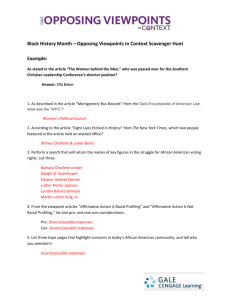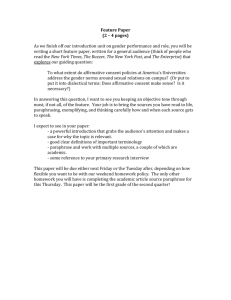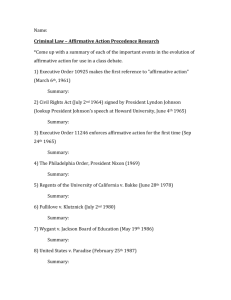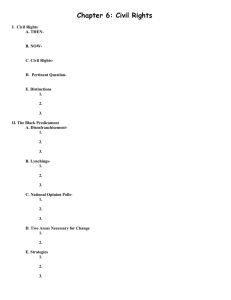Statutory Interpretation
advertisement
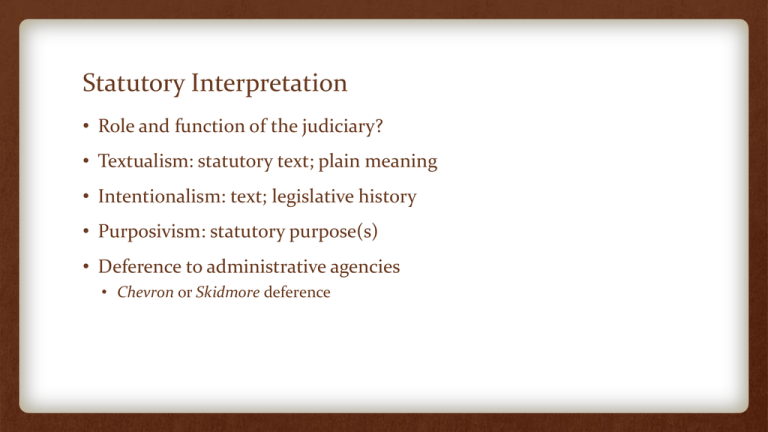
Statutory Interpretation • Role and function of the judiciary? • Textualism: statutory text; plain meaning • Intentionalism: text; legislative history • Purposivism: statutory purpose(s) • Deference to administrative agencies • Chevron or Skidmore deference Affirmative Action—Title VII • Title VII Sec. 703(a) • Unlawful for an employer to “discriminate against any individual . . . because of such individual’s race, color, religion, sex, or national origin” • Title VII Sec. 703(d) • Bans discrimination by labor organizations Affirmative Action—Title VII • Title VII Sec. 703(j): “Nothing contained in this title shall be interpreted to require any employer . . . [or] labor organization . . . to grant preferential treatment to any individual or group because of the race, color, religion, sex, or national origin of such individual or group on account of an imbalance which may exist with respect to the total number or percentage of persons of any race, color, religion, sex, or national origin employed by any employer . . . in comparison with the total number or percentage of such persons . . . in any community, State, section, or other area, or in the available work force in any community, State, section, or other area.” Affirmative Action—Title VII • United Steelworkers of America v. Weber (U.S. 1979) (5-2 decision) • Facts; issue • Weber’s argument, based on a literal interpretation of Secs. 703(a) and (d), “is not without force” but “is misplaced” • The letter and “spirit” of a statute • “Congress’ primary concern” in enacting Title VII? Weber (cont.) • The text and legislative history of Sec. 703(j) • “Nothing in this title shall be interpreted to require . . . preferential treatment . . .” • Sec. 703(j) “does not state that ‘nothing in Title VII shall be interpreted to permit’” voluntary affirmative action. “The natural inference is that Congress chose not to forbid all voluntary race-conscious affirmative action.” Weber (cont.) • Permissible voluntary affirmative action by private employers • (1) The purposes of the plan mirror the purposes of Title VII: “break down old patterns of racial segregation and hierarchy” and open employment opportunities in traditionally closed occupations • (2) The plan does not “unnecessarily trammel” the interests of white employees • (3) The plan is temporary and is intended to attain, and not maintain, racial balance • Holding Weber (cont.) • Justice Blackmun’s concurrence • The “arguable violation” theory • Justice Rehnquist’s dissent • The Court’s reading of Sec. 703(j) is “outlandish” and belied by the background and purpose of that section • “The plain language of the statute” prohibits granting preferential treatment to minorities to correct racial imbalance • “Congress outlawed all racial discrimination . . .” • Most persuasive: Justice Brennan or Justice Rehnquist? Affirmative Action—Title VII • Johnson v. Transportation Agency, Santa Clara County (U.S. 1987) • Nine applicants applied for promotion to road dispatcher position • After interviews, 7 were certified as eligible for promotion; agency director could choose any of the 7 • Paul Johnson ranked second with score of 75; Diane Joyce ranked third with score of 73 • Three agency supervisors recommended Johnson; affirmative action director recommended Joyce Affirmative Action—Title VII • Is there a “manifest imbalance” reflecting the underrepresentation of women in a traditionally segregated job category? • The comparison • The difference between “manifest imbalance” and a prima facie case? • The Weber requirements • (1) Eliminate work force imbalance in traditionally segregated job category? (2) Unnecessarily trammel the rights of male employees? (3) Temporary and not used to maintain work force balance? • Holding Affirmative Action—The Constitution • Wygant: plurality concluded that the remediation of “societal discrimination” alone is not a sufficient justification for race-conscious affirmative action • Croson and Adarand: race-sensitive affirmative action plans are subject to strict scrutiny judicial review • (1) Compelling government interest: remediation of entity’s past discrimination or diversity justification • (2) Effectuated by narrowly tailored means • Sex-conscious affirmative action plans: subject to intermediate scrutiny (important governmental objectives/substantially related means)
